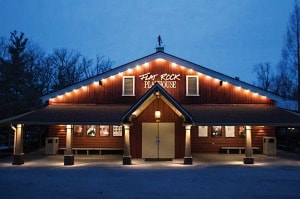All the Prison’s a Stage

NOTRE DAME, IND.: As Scott Jackson, executive director of Shakespeare at Notre Dame, began planning a new program to work with the incarcerated population at nearby Westville Correctional Facility, he figured: Why reinvent the wheel? Why not gather folks who’ve done this kind of work before? Thus was born the first “Shakespeare in Prisons” conference, held over a weekend last November on the campus, which gathered more than 60 practitioners and scholars from all over the English-speaking world, including Wales, London and Australia, as well as the U.S.
Amid two days of panels, practicum sessions and screenings, the featured speakers included Tom Magill, a prisoner-turned-practitioner from the U.K. who was transformed by arts education during a youthful stint in jail and subsequently founded the Belfast-based Educational Shakespeare Company; and Curt Tofteland, whose Kentucky-based program Shakespeare Behind Bars was the subject of a 2005 documentary of the same name, and who has since expanded his efforts to incarcerated and underserved populations in Michigan. “He has a recidivism rate of just under 6 percent,” says Jackson of prisoners under Tofteland’s tutelage. “Among the larger prison population, it’s something like 60 percent who are going back, sometimes even more. That speaks to how effective this engagement is.”
Of all the arts inmates might be exposed to, wherefore the Bard of Avon? “Shakespeare belongs to all of us—every human being can find themselves in Shakespeare,” says Jackson. Of course, it’s more specific than that: “Certain plays—Macbeth, Titus Andronicus, The Tempest—deal with vengeance, forgiveness and virtue in a way that can help them come to terms with their own past. They have almost a hyper-relationship to Shakespeare, as they have experienced events in their lives that most of us never will, whether it be murder or serious betrayal. And when they see a universal voice exploring the motives for committing those kinds of crimes, they understand that they aren’t necessarily a monster—that though they’ve spent years and years incarcerated, that act doesn’t define them as a person.”
Performing such plays, Jackson points out, “becomes so much more than an acting exercise; it becomes a path to redemption and self-forgiveness.” Jackson says the Shakespeare in Prisons conference is planned to be “at least biennial.” Go to www.shakespeare.nd.edu.
If You Can Maquette Here

SAN ANTONIO, TEX.: Actors and directors mark up their scripts and tape the stage floor; costumers sketch their designs. But scenic designers almost invariably use maquettes, or scale models of the sort that architects use, to demonstrate—and even to develop—their ideas for stage sets. With its extensive theatre arts collection, the McNay Art Museum is an ideal place for a consideration of the contemporary use of the maquette in stage design.
In the new exhibit “Constructing the Stage,” iconic work from the McNay collection by four designers—Timothy O’Brien, Ralph Koltai, Adrianne Lobel and Tony Straiges—documents a significant period in stage design and highlights contrasts between British and American approaches to theatre design.
Lobel’s maquette for the opening airplane-arrival tableau of the Houston Grand Opera’s 1987 premiere of Nixon in China, for instance, is constructed from painted wood and paper, as well as bits of wire and found objects. Koltai’s maquette for the Royal Shakespeare Company’s 1979 production of Richard III is a stark landscape that evokes a Richard Serra redesign of Stonehenge, and it is made of lead, metal and wood. The exhibit is up Jan. 22–June 1. Visit www.mcnayart.org.
Scheib’s Test Kitchen

NEW YORK CITY: Jay Scheib’s latest work, Platonov, or the Disinherited, features the auteur’s signature elements of live performance and mixed media, but this time with a big-screen twist: This free-ranging adaptation of Chekhov’s early play will be performed Jan. 8–24 at the Kitchen in Chelsea while being simultaneously broadcast to movie theatres at the Brooklyn Academy of Music and an AMC Theatre in Times Square, among other cinemas. An earlier version of the play premiered last October as part of La Jolla Playhouse’s WoW (Without Walls) festival.
The Guggenheim- and Obie-winning Scheib described Platonov as “a play about young men and women who could have just gone to bed and continued along in their semi-prosperous yet semi-boring lives, even happily—but instead stayed
up and got more drunk and chose a destruction they knew somehow was coming anyway.” Go to www.thekitchen.org.
Book Passage
DALLAS: For all its unique merits, theatregoing doesn’t have a monopoly on cultural activities with a social component. Take book clubs, for example, which offer the chance to gather with likeminded literary fans and discuss common themes and topics. But given that so many plays are adapted from great books, why not combine the pleasures of both?
Such was the thinking behind the new Dallas Theater Center Book Club, which will prepare patrons for an especially literary season with readings of Oedipus the King by Sophocles, to be read in conjunction with DTC’s production of Luis Alfaro’s contemporary Chicano take on the tale, Oedipus el Rey; “A Scandal in Bohemia” from Sir Arthur Conan Doyle’s The Adventures of Sherlock Holmes, which ties into a new Steven Dietz adaptation of an 1899 play by Doyle and actor William Gillette, Sherlock Holmes: The Final Adventure, to be directed by DTC artistic director and Holmes nemesis namesake Kevin Moriarty (April 25–May 25); and Victor Hugo’s Les Misérables, to correspond with a new DTC revival of the ’80s musical (June 27–Aug. 10).
Only serious readers need apply: The cost to join is $250, which doesn’t include show tickets (but does include copies of the books and, most important, wine), and attendance at the club’s eight meetings (there will be two for each play, one about the book, another about the production) is mandatory. After all, you must remember the Texas motto: Go big or go home (and read). Visit www.dallastheatercenter.org/bookclub.php.
A Hike in Carolina

FLAT ROCK, N.C.: Republicans aren’t generally known to favor tax increases. But in North Carolina, where the general assembly and the governor’s mansion are under GOP control, the party seems to have found a tax hike it can live with: a 4.75-percent statewide ticket sales tax, which will expand to include taxes on tickets at movie theatres and sporting events, as well as nonprofits such as museums and theatres. Add in county sales taxes, and the increase, according to Flat Rock Playhouse managing director Hilary Hart, is closer to 7 percent—which is why the theatre announced last month that it would have to raise its prices by 7 percent to make up the difference. So did the larger Diana Wortham Theatre in Asheville, N.C., but not without posting a “call to action” on its website to inform patrons about the new measures and to enlist them in a campaign to overturn or delay them.
“This is the first time nonprofits, and specifically nonprofit performing arts organizations, have been forced to collect sales taxes on their tickets,” says Hart, who worried about the price sensitivity of her mostly older patrons. “The sad thing is there’s not an understanding of what impact this is going to have on us as small nonprofits.” Hart says that estimates of the revenue at stake were in the range of $2–4 million—not enough, she feels, to justify the hardship. “It’s putting a much more significant burden on us,” says Hart, “for not a lot of money for the state.” Go to www.flatrockplayouse.org and www.dwtheatre.com/get-involved/call-to-action.
Fuerza en Numeros
NEW YORK CITY: Two venerable New York Latino theatres, the Puerto Rican Traveling Theater and Pregones Theater, have combined to create one cross-borough organization. PRTT, founded in 1967 by Miriam Colon Valle, has a venue in midtown Manhattan, and Pregones, founded in 1979 by Rosalba Rolùn (along with other artists), has a performing arts space in the Bronx, near Yankee Stadium. Both spaces, and both company names, will be retained.
The formal partnership solidifies a relationship that has been ongoing for a dozen years, in such co-productions as Dancing in My Cockroach Killers, Circa ’95 in “Live”, and The Harlem Hellfighters on a Latin Beat. The combined budget for the new organization, according to the New York Times, will be $2.2 million. Go to www.prtt.org or www.pregones.org.
Storehouse Exposé

HARTFORD, CT.: When a show closes, the physical world created for it—the set, costumes, props and lighting plots—are typically lost to the storehouses of memory, if not to actual storehouses. To celebrate its 50th anniversary, though, Hartford Stage has created an exhibit of design elements from more than 350 productions of the past half century, from Seascape to Hedda Gabler. The “Stagecraft: 50 Years of Design” exhibit, art-directed by Taylor Benedum and curated by Jessica Palmer, is even doing what many good shows do: It’s on tour. This month it’s at the Mark Twain House & Museum in Hartford; in March it can be seen at the New England Carousel Museum in Bristol, Conn.; in April at the State Capitol (also in Hartford); and in June at the Benton Museum of Art on the UConn campus in Storrs. “We have 50 years of history that have been in storage,” says Michael Stotts, Hartford Stage’s managing director, “that we are now bringing out to show to the world.” The plays do go on, after all. To view photos, visit www.hartfordstagephotos.org/index.php?/category/145.

